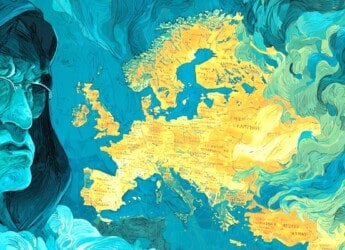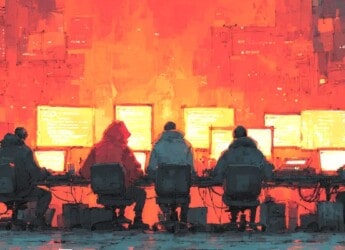Editor’s Note: Global press freedom has entered a perilous new era. The 2025 World Press Freedom Index from Reporters Without Borders (RSF) marks the first time in the Index’s 23-year history that the global environment for journalism is officially classified as “difficult.” For professionals in cybersecurity, information governance, and eDiscovery, this report is more than a media industry barometer—it’s a signal of growing systemic risk. As the economic underpinnings of journalism falter, the ripple effects threaten the integrity of the information ecosystems on which security and legal processes depend. This article examines the key findings from the 2025 Index, highlighting Estonia’s rise as a beacon of media resilience and the mounting challenges faced by Eastern Europe and the United States.
Content Assessment: From Estonia’s Rise to U.S. Decline: Mapping the 2025 Press Freedom Index
Information - 93%
Insight - 94%
Relevance - 90%
Objectivity - 93%
Authority - 94%
93%
Excellent
A short percentage-based assessment of the qualitative benefit expressed as a percentage of positive reception of the recent article from ComplexDiscovery OÜ titled, "From Estonia’s Rise to U.S. Decline: Mapping the 2025 Press Freedom Index."
Industry News – Digital Residency Beat
From Estonia’s Rise to U.S. Decline: Mapping the 2025 Press Freedom Index
ComplexDiscovery Staff
Economic Fragility, Eastern Europe’s Challenges, and Estonia’s Rise
The 2025 World Press Freedom Index, recently released by Reporters Without Borders (RSF), reveals an unprecedented decline in global press freedom. For the first time in the Index’s 23-year history, the worldwide situation has officially been classified as “difficult” with the global average score dropping to a concerning 54.7. This landmark report, which evaluates 180 countries and territories, identifies economic fragility as now rivaling censorship and violence as the primary threat to journalistic independence.
Historic Decline in Global Press Freedom
The 2025 Index findings paint a troubling picture of journalism’s current state worldwide. Half of all assessed countries now face “poor” press freedom conditions. Only 42 countries maintain “satisfactory” or “good” ratings. The economic context indicator has reached its lowest recorded level in the history of the Index.
While physical attacks on journalists remain a significant concern in many regions, RSF’s report highlights that economic pressures have emerged as the most pervasive threat to press freedom globally. In 160 countries, media organizations report achieving financial stability “with difficulty” or “not at all.” Perhaps most alarmingly, one-third of all countries have experienced significant news outlet closures due to economic hardship.
“Guaranteeing freedom, independence, and plurality in today’s media landscape requires stable and transparent financial conditions,” explains Anne Bocandé, RSF’s Editorial Director. “Without economic independence, there can be no free press. When news media are financially strained, they are drawn into a race to attract audiences at the expense of quality reporting, and can fall prey to the oligarchs and public authorities who seek to exploit them.”
Europe: Leading Yet Divided
Europe continues to dominate the top rankings, claiming all fifteen highest positions on the Index. Norway maintains its leadership position for the ninth consecutive year, followed by Estonia, the Netherlands, Sweden, Finland, and Denmark. These nations benefit from robust legal protections, transparent media markets, and strong traditions of journalistic independence.
However, the 2025 Index also reveals growing disparities within Europe. While Nordic and Baltic countries excel, Southern and Eastern European nations struggle with both economic and political pressures that undermine media independence.
Estonia: A Model of Press Freedom Excellence
Estonia stands as a particularly bright spot in the 2025 report, achieving its highest-ever position at second place globally. The Baltic nation has established itself as a model for press freedom through comprehensive legal protections for journalists and media organizations, transparent and well-structured public funding mechanisms, and a thriving digital ecosystem supporting diverse journalism forms.
This combination has allowed Estonia to navigate economic challenges more effectively than most countries, maintaining a pluralistic, independent, and resilient media sector. Estonia has shown steady improvement over recent years, moving up from sixth place in 2024 to claim this historic second position with a score of 89.46, just behind Norway’s 92.31.
Eastern Europe: Struggling with Multiple Pressures
The broader Eastern European region presents a mixed but generally concerning picture in the 2025 Index. While nations like Estonia and the Czech Republic maintain relatively strong positions, much of the region faces interlocking challenges. Economic instability has left many outlets operating with precarious finances, increasing vulnerability to external pressures. Ownership concentration, where media market control rests with a limited number of powerful entities, restricts plurality and independence. Additionally, insufficient or non-transparent public funding further undermines trust and editorial freedom.
These factors create a difficult balancing act for Eastern European media organizations caught between economic survival imperatives and maintaining editorial integrity.
The United States Situation
The United States has dropped to 57th place in the 2025 Index, continuing a troubling downward trend. This represents a significant deterioration for a country once considered a bastion of press freedom. The economic indicator for U.S. media has dropped dramatically over the past two years, with vast regions turning into “news deserts” where local journalism has collapsed. This economic fragility, combined with increasing political hostility toward media, has created an increasingly challenging environment for American journalists.
Why This Matters: Information Integrity Implications
For professionals in cybersecurity, information governance, and eDiscovery, the 2025 World Press Freedom Index findings represent more than just journalistic concerns—they directly impact the integrity and reliability of our entire information ecosystem.
A strong, independent press serves as a critical defense against disinformation and cyber-enabled influence operations. Economically weakened media organizations have diminished capacity to investigate and expose digital threats, potentially allowing cybercrime and state-sponsored attacks to flourish unchecked.
Effective governance depends on accurate, timely information from diverse sources. As media organizations struggle or close, the preservation of public records, governmental transparency, and fact verification in complex regulatory environments all become more challenging.
Legal discovery processes often rely on robust journalism and independent media archives to establish the authenticity and provenance of digital evidence. The erosion of these resources increases the risk of critical data loss for litigation, compliance, and investigative purposes.
A Call for Action
The 2025 Index serves as a warning that without urgent intervention to strengthen the economic foundations of independent journalism, our information environment grows increasingly vulnerable to manipulation and abuse. For information professionals tasked with protecting digital assets, governing data flows, or conducting legal discovery, the health of the media sector directly impacts broader societal resilience.
The contrasting examples of Estonia’s success and the challenges faced elsewhere in Eastern Europe offer valuable insights into potential paths forward. By studying both the achievements and the setbacks documented in the 2025 Index, stakeholders across government, business, and civil society can develop more effective strategies to preserve press freedom and, by extension, the integrity of our shared information space.
News Sources
- Reporters Without Borders (RSF). (May 3, 2025). 2025 World Press Freedom Index: Economic Fragility a Leading Threat to Press Freedom. https://rsf.org/en/index
- Tambur, S. (May 2, 2025). Estonia climbs to second in global press freedom index. Estonian World. https://estonianworld.com/security/estonia-climbs-to-second-in-global-press-freedom-index/
- Meduza. (May 3, 2025). Between independence and survival: Economic pressure brings global press freedom to ‘unprecedented’ low in 2025, says Reporters Without Borders. https://meduza.io/en/feature/2025/05/03/between-independence-and-survival
- Global Investigative Journalism Network. (May 2, 2025). Reporters Without Borders: Global Press Freedom at Unprecedented, Critical Low. https://gijn.org/stories/global-press-freedom-at-unprecedented-critical-low-reporters-without-borders/
- Euronews. (May 2, 2025). Press freedom in Europe deteriorating, Reporters Without Borders says. https://www.euronews.com/my-europe/2025/05/02/europe-best-region-in-world-for-press-freedom-but-situation-worsening-says-rsf
- Axios. (May 2, 2025). U.S. press freedom falls to historical low. https://www.axios.com/2025/05/02/usa-press-freedom
- France24. (May 2, 2025). World press freedom plummets with ‘alarming deterioration’ in US under Trump, says RSF. https://www.france24.com/en/live-news/20250502-alarming-deterioration-of-us-press-freedom-under-trump-says-rsf
Assisted by GAI and LLM Technologies
Additional Reading
- Cybersecurity in Transition: Insights from the 2025 DSIR Report
- ENISA Report Warns of Rising Cyber Risks to Orbital Infrastructure
Source: ComplexDiscovery OÜ


























